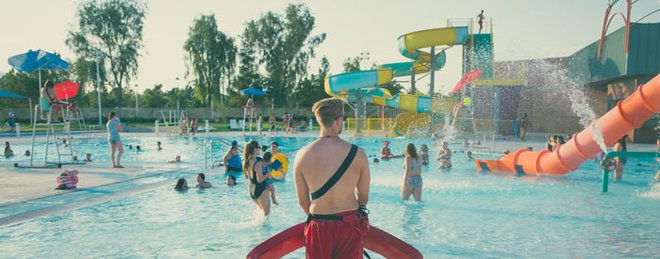What’s summer without water? Not as fun! No doubt you’ll do some swimming. To keep it awesome and accident-free in the pool, lake, ocean or water park, be aware of your safety. Even avid swimmers can hurt themselves if they’re not careful, so don’t be too cool for water rules!
Good swimmers can still drown. Drowning happens when water enters the lungs and no oxygen can reach the body. Not very common, you’re thinking? Drowning is the second most common cause of death from injuries in kids under age 14. An estimated 351 pool or spa drownings happened each year from 2013 to 2015 for kids under 15.
Every year, an estimated 6,400 people visit the emergency room for nonfatal drowning accidents. Many drownings or near-drownings happen when kids accidentally fall into a pool and hit themselves on its hard surface.
 Floaties are toys. They don't save lives!Courtesy of Garett Mizunaka
Floaties are toys. They don't save lives!Courtesy of Garett Mizunaka
Remember, when you swim in a pool:
- Who’s around? Swim only when there’s a lifeguard on duty or an adult watching you. Even if you’re swimming in your own back yard, someone needs to watch you. If you’re in trouble, you most likely won’t be able to call out. A drowning can happen in less than two minutes, and often occurs with little noise or no splashing for others to hear.
- If you don’t know how to swim, learn. It will bring you not only enjoyment, but a layer of safety and confidence every time you enter the water, for years to come.
- If the gates are closed, so is the swimming. Closed gates mean the pool is unsafe for one reason or another. Don’t risk it!
- Don’t jump in yet! Did you check the water depth? A big jump into a shallow pool can result in a painful landing.
- Attention beginners…Once you’re in the pool, you’ll want to stay in the shallow area if you’re a beginner swimmer. Never go into water that’s deeper than you’re comfortable with. Also, floaties are fun, but they won’t save your life—They’re toys. If you’re learning using a flotation device, make sure it’s one that an adult says is coast guard approved.
- Obey pool rules. Don’t chew gum; It can get stuck in your throat while swimming. Don’t run around a pool.
- Be a smart diver. If you want to dive, do it off the diving board. Don’t dive off the side of a pool unless an adult tells you it’s deep enough. Diving in shallow water can cause extreme head and neck injury.
- Test the water. How cold is it? Very cold water can make it hard to swim by shocking your body and slowing down your muscles.
- Water park rules—Don’t ignore the signs. They’ll tell you how old you should be before you go on a ride. Follow rules and lifeguard directions for water slides.
 Listen to the lifeguards! They're trained to help you. Courtesy of neonbrand
Listen to the lifeguards! They're trained to help you. Courtesy of neonbrand
Spas and hot tubs
Spas can be relaxing to hang out in, but they are dangerous to kids if the water is too hot, you’re too young, you stay in for too long, or your hair gets caught in a drain.
- Don’t put your head underwater in a spa, or anywhere near a drain.
- The water needs to be around 98 degrees and you shouldn’t stay in a spa for longer than 5 to 20 minutes.
- Younger kids shouldn’t go in spas.
- Drink water before going in one.
- If you feel sick, dizzy or sleepy, get out.
- Don’t use a spa before, during or after a thunderstorm. It could cause electrocution.
- Know where the cut-off switch is in case of an emergency.
- Don’t play rough in a spa. No jumping, pushing, etc.
- Always have supervision. Yes, even in a spa. Yes, even if you can swim.
 How strong is the ocean current? Find out.Courtesy of Diana Macesanu
How strong is the ocean current? Find out.Courtesy of Diana Macesanu
What about lakes, ponds and oceans?
- They can be loads of fun to swim in, but take a minute to think about these tips before taking a dip:
- How deep is it? Make sure you know. You can’t always see the bottom of a lake or pond.
- Protect your feet. Wear something like water shoes in case you step on sharp rocks or broken glass.
- Be aware of seaweed. It can trap even a good swimmer.
- Wear a life jacket if you’ll be riding on a boat. Even if you can swim, you need one. A boat can tip over and riders could get trapped underneath.
- At the ocean, how strong is the current? Find out from the lifeguard. Stay close to an adult or get out of the ocean when the waves are rough. Rough waves can push swimmers to the ocean floor—Not fun! In some cases, strong undertows can carry swimmers away from shore. Don’t panic if you're in trouble--Stay calm and call for a lifeguard.
- Know your limits. If you get cramps or your muscles feel tired in the water, you might want to get out and take a rest.
 Courtesy of Vidar Nordli Matheson
Courtesy of Vidar Nordli Matheson
Swimming should be fun. Be smart, mature, and pay attention to these tips—They are meant to keep it that way. Enjoy!

































